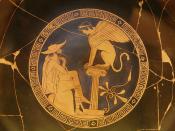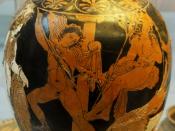D.T. Suzuki, a renowned expert on Zen Buddhism, called attention to the topic of free will in one of his lectures by stating that it was the battle of 'God versus Man, Man versus God, God versus Nature, Nature versus God, Man versus Nature, Nature versus Man1.' These six battles constitute an ultimately greater battle: the battle of free will versus determinism. Free will is that ability for a human being to make decisions as to what life he or she would like to lead and have the freedom to live according to their own means and thus choose their own destiny; determinism is the circumstance of a higher being ordaining a man's life from the day he was born until the day he dies. Free will is in itself a far-reaching ideal that exemplifies the essence of what mankind could be when he determines his own fate. But with determinism, a man has a predetermined destiny and fate that absolutely cannot be altered by the man himself.
Yet, it has been the desire of man to avoid the perils that his fate holds and thus he unceasingly attempts to thwart fate and the will of the divine.. Within the principle of determinism, this outright contention to divine mandate is blasphemous and considered sin. This ideal itself, and the whole concept of determinism, is quite common in the workings of Greek and Classical literature. A manifest example of this was the infamous Oedipus of The Theban Plays, a man who tried to defy fate, and therefore sinned.
The logic of Oedipus' transgression is actually quite obvious, and Oedipus' father, King Laius, also has an analogous methodology and transgression. They both had unfortunate destinies: Laius was destined to be killed by his own son, and Oedipus was destined to kill...


